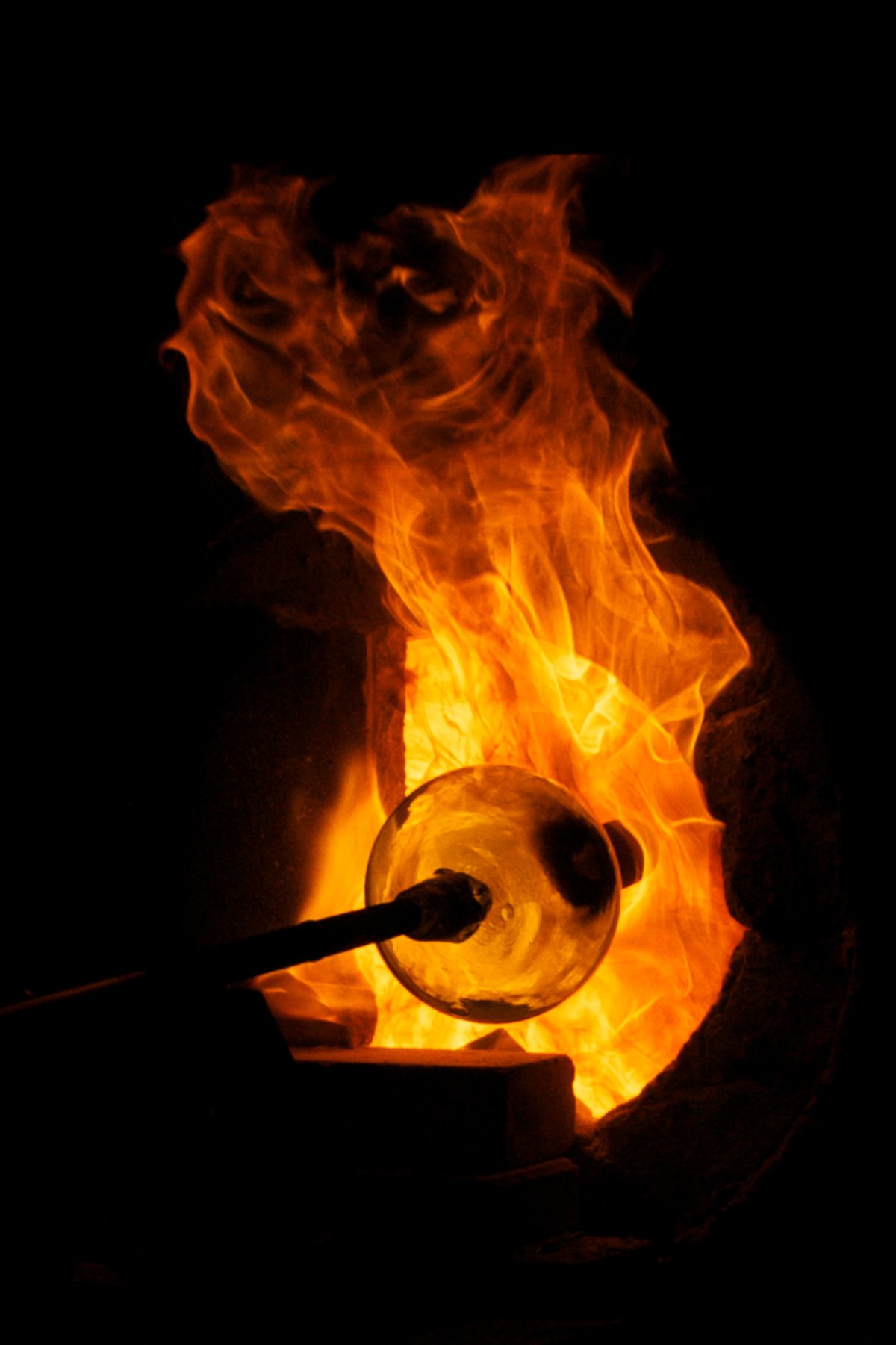"To make glass is to know failure," Ryan Bradley wrote in his Fortune magazine profile of Corning Inc. A glassmaker starts out with powders of oxides, stirs them into a platinum crucible and sticks that brew into an oven set at a temperature of 2,912 degrees Fahrenheit. The oxides melt into a molten liquid, which the glassmaker then removes. The liquid cools, and the concoction hardens to glass.
"But to really know glass, to get a sense of its strength, you must break it," Bradley wrote. "So someone bends and hammers and sometimes throws baseballs at the glass until it scratches or cracks or shatters." Glass fails, researchers learn from the failure, and the cycle repeats. And improves.
Glassmakers know that from failure comes strength.
Few companies in the world know more about resilience than Corning. The same company that developed the glass for the Edison bulb now makes the glass that covers billions of smartphones, tablets and screens for Apple, Samsung and other manufacturers.
Human beings grow stronger through failure too. Only by taking risks do we experience failure and its companion, success.
Think about the most basic risk we take each day: We leave home and get into the car. We know that 30,000 people a year die because they've taken that risk. But to not get out into the world would be a bigger risk. Because we'd be missing out on life itself. That's just one of many risk-reward trade-offs we make every day in our lives, often without even knowing we're doing it.
The bigger risks we take are with our hearts when we tell people we love them. By doing so, we open up the possibility that the person we love may not return it. Or may betray us. But the bigger risk is to never have loved at all.
"We must love one another or die," closes one of the 20th century's greatest poems, "September 1, 1939," W. H. Auden's reflection on the start of World War II. Even amidst the outbreak of a kind of chaos that makes our current chaos look mild, Auden left readers with a stark choice. Love. Or die.
Some of us take an even bigger risk and get married. We take the "till death do us part" oath. It would be more practical to date someone you love and see how things play out. Why take the risk of a lifetime commitment when you don't even know what the next year will bring, let alone the next day?
Some of us double down on that marriage bet and do something riskier: start a family. Life would be easier—and cheaper—for married people if they chose not to have kids. Kids are loud and smelly and selfish and need years—in some cases, decades—of nurturing to face the exigencies of life on their own.
It can come with great heartache. But raising a good, productive human being may be the most meaningful experience of any person's life. I know it's been so for me and my bride. Life without our 16-year-old daughter would be unimaginable.

Then there is the kind of risk-taking we do with our thoughts. Daring to speak your mind about the things you believe knowing you may get a lukewarm, or hostile, reaction. Daring to challenge the prevailing status quo in your profession, your classroom or even with family members is filled with risk.
And then there is the type of risk-taking associated with the American dream: starting a business. It's the biggest risk people can take with their capital and their time. Those dreamers—they come in every color and creed—put their life, and life savings, on the line. The workload is brutal, and the path to profitability is replete with obstacles. Indeed, there are so many ways a business can fail that a clever entrepreneur is lucky if he or she can think of half of them.
One thing we know for certain: All of this risk-taking—with our minds, hearts, lives and treasure—fuels not only personal growth but the growth of economies. And the growth of nations.
So how is American doing on the risk-taking front? And on the resiliency front, which risk-taking and failure cultivate?
Take business formation. Before the forced lockdowns because of COVID-19, fewer Americans were starting businesses than at any time in recent history. A Wall Street Journal article headlined "Risk-Averse Culture Infects U.S. Workers, Entrepreneurs" revealed some disturbing trends. In 1982, companies that had been in business less than five years made up almost half of all American companies. By 2011, that number had declined to slightly more than a third. And the percentage of America's workforce employed by new companies dropped from over 20 percent to less than 11 percent.
How important are startups to the economy? "When it comes to U.S. job growth, startup companies aren't everything. They're the only thing," a Kauffman Foundation study reported. Each year, on average, new companies add 3 million jobs to the economy, while older companies lose 1 million annually.
Risk-taking has also been on the decline on the romance front. In a 2013 New York Times article titled "The End of Courtship?," Alex Williams interviewed 20- and 30-something singles about their romantic relationships. "The word 'date' should almost be stricken from the dictionary," one subject said. "Dating culture has evolved to a cycle of text messages, each one requiring the code-breaking skills of a cold war spy to interpret," another subject noted. One subject said it best: "I've seen men put more effort into finding a movie to watch on Netflix than composing a coherent message to ask a woman out."
Recent surveys also reveal that marriage rates are on the decline. In 1960, nearly 70 percent of American adults were married; now, it's closer to 50 percent. The numbers don't look any better on the children front. The Pew Research Center reports that the U.S. birth rate in 2019 was a mere 58.3 births for every 1,000 women ages 15 to 44 in the U.S., down from 59.1 in 2018, making 2019 the fifth consecutive year in which the fertility rate had declined. That's down from 122.7 in 1957. And while the birth rate has dropped, the U.S. now has the distinction of being the world's leader in children living in a single-parent household.
The risks we take with our minds are also on the decline. A recent Cato Institute survey reported that nearly two-thirds of Americans say the political climate prevents them from saying things they believe, for fear of offending someone. And 32 percent report being afraid to speak their minds because they might miss out on a job opportunity or get fired if their political views become known.
Does anyone believe that such unhealthy rates of self-censorship make for a more resilient country? Or ever-declining rates in business and family formation?
What's going on in a nation that's always celebrated risk-taking, family and basic freedoms like free speech? Why are we taking so much less risk with our lives?
A big part of it is cultural. From rubberized playgrounds to scoreless soccer, from social promotion to no red ink on school papers, from automaker bailouts to bank bailouts, we're living in a culture where risk-taking isn't cultivated and failure isn't permitted. We've been so busy coddling our children—and ourselves—that we've made our country less resilient.
It hasn't helped that our nation's colleges have been setting up regimes to control or limit free speech. Safety zones, trigger warnings and other practices designed to protect students from hearing things that may offend them have created a level of self-censorship that has permeated all walks of American life.
But a big part of this growing anti-resilience trend just might be that we've lost faith in ourselves. With the culture everywhere trying to protect us from every possible harm, we've lost the pioneer spirit that generations before us had and acted upon without much worry or navel-gazing.
We may also have lost our belief in the idea that taking risks and taking on responsibilities—and enduring a failure here and there—builds character. Of individuals. And nations.
And we've lost all sense of history. America has faced much worse perils than those we face today. We've survived a battle for independence, a civil war, two world wars, recessions and depressions—and, always, we've come out stronger.
Why should we take more risks with our lives—and our hearts and minds? Because not taking risks is more dangerous than taking calculated ones. Because success—and a life well lived—is a result of failures along the way.
"I think of my failures as a gift," A.G. Lafley, a former Procter & Gamble CEO, told Harvard Business Review in 2011. "We learn much more from failure than we do from success."
Failure is nature's way of teaching us lessons we can't learn any other way. And protecting our kids—and our citizens—from life's risks isn't possible. If what we're trying to cultivate is independence and self-reliance in our kids and our nation, such efforts will have the very opposite effect, breeding more dependency and an inability to cope with the realities of life.
Deep down, Americans want to start acting like Americans again. Like the hopeful, optimistic, daring people we've always been. We want to take chances again and, like those researchers at the Corning factory, emerge from our failures stronger. All it takes is for more of us to have courage with our capital, hearts and minds and worry less about the downsides of risk and failure.
It's a hell of a lot better way to live a life. And a hell of a lot more fun.
Uncommon Knowledge
Newsweek is committed to challenging conventional wisdom and finding connections in the search for common ground.
Newsweek is committed to challenging conventional wisdom and finding connections in the search for common ground.
About the writer
To read how Newsweek uses AI as a newsroom tool, Click here.





